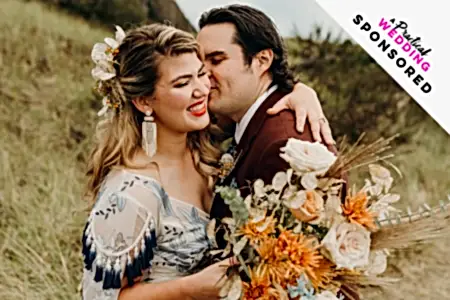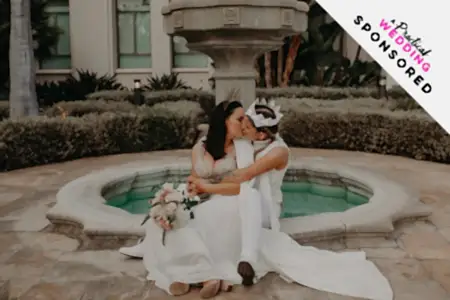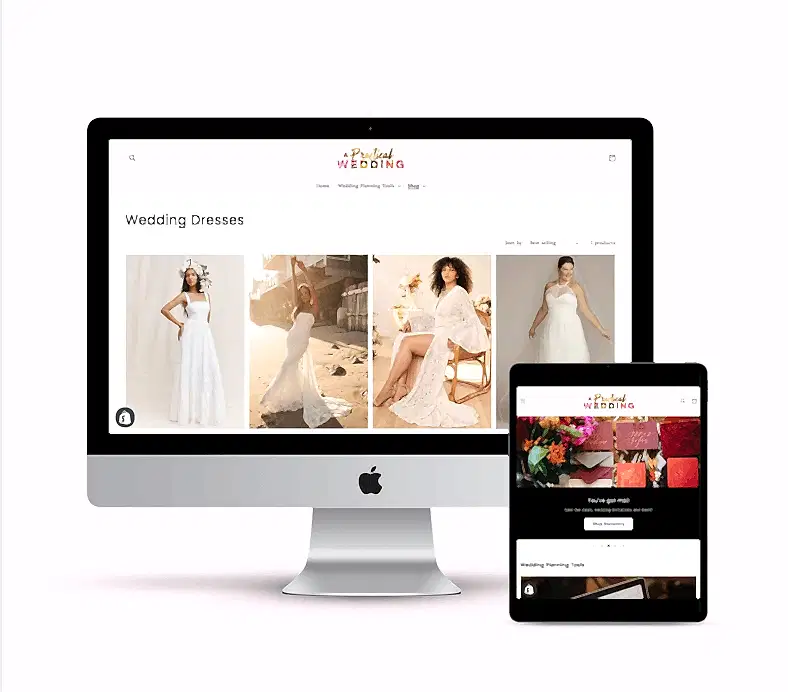

When I first started applying for jobs, fresh from college, I would spend hours agonizing over the perfect cover letter. Did I sound professional enough? Was I writing too much? Did I effectively convey my enthusiasm for the company? Over time, I perfected a formula that I was sure would wow prospective employers. But now, as one of APW’s hiring managers, I realize I was doing pretty much everything wrong.
Cover letters are hard, y’all. You get one shot to make an impression, with only an educated guess as to what the person on the other end of your email is looking for. And I think they can be particularly challenging for young women. I see it all the time with my friends: we’re taught to downplay our achievements, to never sound boastful, so when it comes time to try and convince a perfect stranger that we’re thebomb.com, we have a hard time finding the right words. So when I found out we were going to have the opportunity to work with Squarespace on a series of career-related posts this year, I was excited to get into the logistics of getting hired. Because promoting a more egalitarian workplace starts with getting more women into jobs in the first place. And that starts with the application process.
Before I get into the nitty gritty of what makes a great cover letter, here are a few caveats:
- These tips are specifically intended for jobs where a level of creativity is encouraged. (AKA, if you’re a lawyer, your mileage may vary. A lot.)
- No matter what the Internet tells you, nothing can guarantee you an interview. You can only increase your chances, so it’s not worth beating yourself up if you follow all the best career advice and then don’t get a call back. Applications get rejected for a host of reasons related to timing, volume of applications, and the whims of the hiring manager.
- Format-wise, you’ll find conflicting advice online, but I always prefer a short, concise cover letter that gets right to the point, is roughly three paragraphs long (no more than a page) and is included in the body of your email (the fewer attachments I have to open, the better). If you are including attachments, don’t forget to fix things like the file name. I would rather not open up a cover letter titled “Why Maddie is the shit,” or (on the flip side) “Generic Media Cover Letter.”
With that said, here are seven tips for increasing your chances of making it to the “yes” pile:
1. Connect The Dots
One of the hardest things to figure out when putting together your cover letter is what the hell is it supposed to do? You don’t want to reiterate your resume. But then what? Above all, your cover letter should help make connections between your resume and the job listing. Most of us are not applying for jobs that we have the exact skills and qualifications for. So you need to help connect the dots for the hiring manager. For example, a friend was recently applying for a content manager position at a fitness website. While she’d never worked as a content manager before, she had run her own fitness studio, which meant she has a wealth of knowledge on the subject. Plus, her studio sent out a monthly newsletter, and her writing was good enough that it had been published in major online publications. With that combined she had all the right skills and qualifications, but she needed to spell it out, or the hiring manager could have missed it while glancing at her resume. A word to the wise: never acknowledge out loud that you don’t have the experience for the job. Let the hiring manager decide that for you. (Because apparently it is a uniquely female assumption that you need to be a hundred percent qualified to apply for a job.)
Weak: I know I don’t have the exact experience that you’re looking for, but I think my work as a fitness instructor and small business owner give me a unique perspective on the industry and have armed me with the right skills to handle this position.
Strong: My combined experiences have given me the skills to handle this job. For the past seven years, I have run my own fitness studio, and during that time I have built and supported my own websites, designed and maintained several social media platforms, including growing my Facebook page from scratch to over 6,000 followers, created weekly newsletters for a mailing list of 200 people, run 30-day health challenges, and been tapped to write for established niche websites with large, dedicated audiences. (For sample writing you can click here or here.)
2. Make it about them, not you
When I look back at my earliest cover letters, the most glaring mistake I see is that I made it all about me. Why I loved the company, why it was such an amazing opportunity. But employers don’t want to hear about how the job is going to benefit you. They want to know how you are going to benefit them. So while you want to make it clear that you actually understand the company you’re applying to, keep it brief and skip right to the part where you tell them that you are the dream candidate. For example:
Weak: I read APW every day; not only did your website help me plan my wedding, it also serves as my primary source of smart feminist commentary on the Internet. I love reading APW so much.
Strong: I binged on every single one of the APW archives while helping to plan my sister’s wedding. If you’re looking for someone who understands your content, the only person who knows it better than me right now is you.
3. Don’t forget it’s a job
We get a lot of applications at APW that spend more time talking about how much the applicant wants to be part of the team than about the job posting itself. I think that’s a common thing at creative workplaces, especially when companies are trying to reel you in with their laid-back or fun work culture. But even if the company you’re applying to has a ball pit in the middle of their office, it’s important to let the hiring manager know that you are there to work. In fact, it’s especially important in those cases, because the company needs to be able to weed out the applicants who actually want the job from the applicants who just want to work in an office with a ball pit. So how do you show genuine interest in a way that’s going to resonate with the hiring manager?
- Show that you’re not only excited about the job, but that you really understand the company.
- Demonstrate that you’re excited to make the company better.
- Let the hiring manager know that you understand the meaning of hard word.
For example:
Weak: Ever since I was a kid, I’ve loved television. But I didn’t know what it was to respect television until I discovered the series Mad Men. I admire everyone who works at the AMC Network, and am excited about the possibility of joining such an amazing team.
Strong: I still remember the first time I saw an ad for Mad Men on the New York City Subway. I knew it meant the cable industry was about to change. Having assisted both on production sites and inside network offices, I know that what goes into making original programming is so much more than lights, camera, action—which is why I am prepared to get my hands dirty as your online Marketing Coordinator. Over the past four years, I’ve developed a diverse portfolio of social media experience, and I think I can bring a fresh perspective to your team to help make your online presence more dynamic and engaging for your followers.
4. Be Your Own Hype Person
Every other month or so, a friend asks me to edit their cover letter, and my first bit of feedback is always the same: you have to be your own hype girl. Because the requisite, “I think I’d be a good fit for the position,” starts to sound the same after you’ve read dozens of back-to-back applications in a row. And if you can’t articulate why you’re awesome, the person reading your application isn’t going to read between the lines and do it for you. But how do you sell yourself without sounding like a jerk? (Because as Luvvie so wisely says, there’s a fine line between believing in yourself and believing your own hype.) The Muse has a great tip: pretend like the person on the other end of the email already likes you.
Weak: I’m looking to make a career change, and when I saw this job opportunity, it seemed like a perfect fit.
Strong: I’ve spent the past five years growing my own business, and I will use those skills to help your company expand on both its vision and its bottom line.
5. Use numbers anywhere you can
The most impressive feats can fall on deaf ears if you don’t have a way to quantify them. Why? Because numbers are illustrative. They help paint a picture of your experience in a way that descriptors just can’t. When I was first applying for jobs, I thought this meant I needed to make up (well…embellish) numbers about how I’d increased intern efficiency by 30%. But you don’t need to invent something that’s not there. For example:
Weak: As a receptionist for Romy & Michele designs, I handled busy phone lines, coordinated travel for multiple executives, and published our monthly industry newsletter.
Strong: I am excellent at handling multiple tasks at the same time. As a receptionist at Romy & Michele designs, I managed busy phone lines for six different executives and coordinated monthly travel for a staff of over sixty staff members, all while publishing monthly newsletters that went out to an industry-wide mailing list of over 600 people (which grew by 40% while I was there).
6. Show, Don’t Tell
It’s really hard for hiring managers to visualize your talents. So as much as you can, give them tangible examples of your work. If the job involves writing, make sure you have a portfolio website with examples of your recent work (hint: Squarespace makes it hella easy to create a professional website). If you’ve executed work with some kind of visual component, put it online. The more you can back up your words with images and examples, the more legit your experience will seem.
Examples: Meg’s website, Lindy West, APW Contributor Faz
7. Go Above and Beyond (but not too far)
When Najva first applied to APW, she was the only person who submitted a writing sample in the style of an APW post (complete with a photo and our signature big pink letter at the beginning of the post). And while it wasn’t a requirement, she noticed a few things about our site that weren’t functioning as well as they could be, and made suggestions for how we might want to fix them. So while her resume probably had some of the least direct experience, her effort alone secured her an interview. And she took it from there.
But be careful. Going above and beyond should ultimately be in service of the people you’re applying to. You don’t want to make more work for the hiring manager, just impress them with your level of dedication. So avoid things like submitting four writing samples when there was a request for two. Or writing a three-page long cover letter.
And spell check. But you knew that already.
Have a cover letter you were super proud of? Share it in the comments. And if there are any hiring managers in our midst, leave your best tips here too!

This post was sponsored by Squarespace, who we are partnering with this year to bring you a series of career conversations about what it means to be a woman in the workplace in 2016. If you’re in the market for a new job or looking to explore your options, one of the best things you can do to supplement your cover letter and resume is to create a professional website where you can show off your work, host an online resume, or simply display how awesome you are. And it just so happens that Squarespace provides the creative tools that make it easy to build that website beautifully, even if you’ve never made a website before and have no idea where to start. In conjunction with our career series this year, Squarespace is offering APWers a 10% discount on yearly subscriptions when you use the code APW16 at checkout. Click here to get your website started today with a free 14-day trial from Squarespace.






